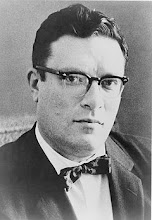Joseph F. Engelberger (born in New York City, July 26, 1925) is an engineer and entrepreneur who is often credited with being the "Father of Robotics".[1][2] Along with the inventor of the industrial robot, George Devol, Engelberger developed the first industrial robot in the United States, the Unimate, in the 1950s. Later he worked as entrepreneur and vocal advocate of robotic technology beyond the manufacturing plant in a variety of fields, including service industries, health care, and space exploration.
[edit] Biography
In 1956, Devol and Engelberger founded Unimation Inc., which was the world's first robotics company. Two years earlier Devol had already secured the patents for the robot technology in the company's Unimate robot. They installed their first industrial robots at General Motors in 1961. Over the next two decades, the Japanese took the lead by investing heavily in robots to replace people performing certain tasks. In Japan, Engelberger is widely hailed as a key player in the postwar ascendancy of Japanese manufacturing quality and efficiency.[citation needed]
In 1966, Engelberger and a Unimate robot appeared on The Tonight Show Starring Johnny Carson. In the segment, the robot poured a beer, sank a golf putt, and directed the band.
The Robotics Industries Association annually presents the Joseph F. Engelberger Awards to "persons who have contributed outstandingly to the furtherance of the science and practice of robotics." The 2000 World Automation Congress was dedicated to Engelberger, who delivered the keynote address.
An early proponent of increased investment in robotic systems, Engelberger published articles and gave Congressional testimony on the value of using automation in space long before successes of the NASA's Mars landers, Galileo, and other unmanned space science missions.
Engelberger's 1980 book, Robotics in Practice, has been translated into six languages. This was followed by Robotics in Service (1989).
Engelberger was elected to the National Academy of Engineering in 1984. Additional honors include the Progress Award of the Society of Manufacturing Engineers, the Leonardo da Vinci Award of the American Society of Mechanical Engineers, the 1982 American Machinist Award, the McKechnie Award from the University of Liverpool, the Egleston Medal from Columbia University, the 1997 Beckman Award for pioneering and original research in the field of automation, and the 1997 Japan Prize, the highest Japanese technology honor, for the establishment of the robot industry.
Engelberger received his B.S. and M.S. degrees from Columbia University, in 1946 and 1949, respectively. Between 1946 and 1956, he was an engineer with Manning, Maxwell and Moore. In 1957, he founded Consolidated Controls Corporation. In 1962 he founded Unimation Inc., and served as chief executive until it was acquired by Westinghouse in 1982. In 1984, he founded Transitions Research Corporation which became HelpMate Robotics Inc. HelpMate was acquired by Cardinal Health in 1997. In his more recent work, Engelberger has focussed on mobile, sensate robots can work with human mentors in service activities. The HelpMate, a robotic hospital courier, is the most widely known and has been installed in over dozens of hospitals around the world. Engelberger has been active in the promotion and development of robots for use in elder care.
Tuesday, February 16, 2010
Subscribe to:
Post Comments (Atom)

No comments:
Post a Comment